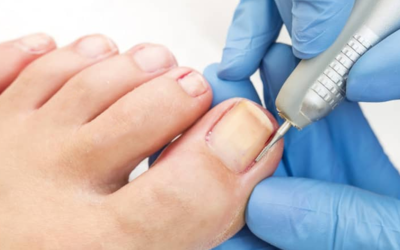Foot fungal infections are a common yet frustrating condition that can cause itching, redness, discomfort, and even thickened nails. These infections thrive in warm, moist environments and can spread easily, making prevention and early treatment essential. While mild cases can often be treated at home, persistent infections require professional care to avoid complications.

At Capital Foot Care, our expert podiatrists—Dr. Muhammad A. Khalid, Dr. Fritz-Andre Duterlein, and Dr. Herman Zarate—specialize in diagnosing and treating foot fungal infections to help patients regain healthy and comfortable feet. Whether you’re dealing with athlete’s foot, toenail fungus, or chronic fungal infections, we offer advanced solutions tailored to your needs.
Understanding Foot Fungal Infections
Fungal infections of the feet are caused by microscopic fungi that thrive in damp conditions, such as inside sweaty shoes or public showers. The two most common types of foot fungal infections are:
- Athlete’s Foot (Tinea Pedis): A highly contagious fungal infection that affects the skin on the feet. Symptoms include itching, peeling, redness, and cracking of the skin, particularly between the toes.
- Toenail Fungus (Onychomycosis): A fungal infection that affects the nails, causing them to become thick, yellow, brittle, and crumbly. This condition can take months to treat and may require prescription medications or laser therapy.

Both conditions are contagious and can spread to other parts of the body or to other people if not properly managed.
Common Causes of Foot Fungal Infections
Several factors contribute to the development of foot fungus, including:
- Walking barefoot in public places like pools, gyms, and locker rooms
- Wearing tight or non-breathable shoes that trap moisture
- Excessive sweating
- Sharing personal items like socks, shoes, or nail clippers
- Weakened immune system due to diabetes, poor circulation, or chronic illnesses

By recognizing these risk factors, you can take proactive steps to prevent infections and maintain healthy feet.
How to Prevent Foot Fungal Infections
Taking proper precautions is key to avoiding fungal infections. Here are seven essential foot care tips:
- Keep Your Feet Clean and Dry
- Wash your feet daily with soap and warm water and dry them thoroughly, especially
between the toes. - Use foot powders or antifungal sprays to keep feet dry.

- Wash your feet daily with soap and warm water and dry them thoroughly, especially
- Choose the Right Footwear
- Wear shoes made from breathable materials like leather or mesh.
- Rotate shoes to allow them to fully dry before wearing them again.
- Wear Moisture-Wicking Socks
- Choose cotton or moisture-wicking socks to keep your feet dry.
- Change socks daily, especially after sweating or exercise.
- Avoid Walking Barefoot in Public Areas
- Always wear sandals or flip-flops in public showers, locker rooms, and swimming pools.

- Always wear sandals or flip-flops in public showers, locker rooms, and swimming pools.
- Disinfect Your Shoes and Socks
- Spray shoes with antifungal powder and wash socks in hot water to kill any lingering
fungi.
- Spray shoes with antifungal powder and wash socks in hot water to kill any lingering
- Trim Toenails Properly
- Cut nails straight across to prevent fungal infections from spreading.
- Use sterilized clippers to avoid contamination.
- Do Not Share Personal Items
- Avoid sharing nail clippers, socks, towels, or shoes to reduce the risk of infection.
Following these simple tips can significantly lower your risk of developing athlete’s foot or toenail fungus.
Effective Treatments for Foot Fungal Infections
If you suspect a fungal infection, early treatment is essential to prevent worsening symptoms. Here are some of the most effective treatment options:
Over-the-Counter (OTC) Treatments
Mild cases of athlete’s foot can often be treated with antifungal creams, sprays, or powders containing clotrimazole, terbinafine, or miconazole. These treatments eliminate fungi and relieve symptoms like itching and peeling.

Prescription Medications
For stubborn fungal infections, a podiatrist may prescribe stronger antifungal creams or oral medications such as terbinafine or itraconazole. These are particularly effective for severe toenail fungus.
Laser Therapy for Toenail Fungus
For persistent toenail fungus, laser therapy is a cutting-edge treatment that targets and destroys fungal infections without damaging the surrounding nail or skin.

Medical Foot Soaks
Soaking your feet in a vinegar or antifungal solution can help reduce fungal activity and soften thickened nails.
When to See a Podiatrist
If home treatments do not work or if your condition worsens, professional podiatric care is essential. You should see a podiatrist if you experience:
- Persistent itching, peeling, or burning skin
- Thickened, discolored, or brittle toenails
- Pain, swelling, or signs of infection (pus, redness, or foul odor)
- Recurring fungal infections that don’t go away with OTC treatments
At Capital Foot Care, our team of expert podiatrists provides advanced treatment options to ensure long-term relief from foot fungal infections.
Why Choose Capital Foot Care?
At Capital Foot Care, we are dedicated to keeping your feet healthy and free from infections. Our team—Dr. Muhammad A. Khalid, Dr. Fritz-Andre Duterlein, and Dr. Herman Zarate—offers comprehensive evaluations, personalized treatment plans, and the latest medical advancements for foot fungal infections.

For expert care, contact us today at 301-927-FOOT (3668) or email [email protected] to schedule an appointment. Visit Us at One of Our Convenient Locations:
- 6510 Kenilworth Ave. Suite 2300, Riverdale, MD 20737
- 7610 Carroll Ave. Suite 380, Takoma Park, MD 20912
- 8816 Jericho City Drive, Largo, MD 20785
- 2041 Martin Luther King Jr Ave SE, Suite 103, Washington, DC 20020
- 1328 Southern Ave SE, Suite 209, Washington, DC 20032
Foot fungal infections can be uncomfortable and persistent, but proper prevention and timely treatment can help you maintain healthy, infection-free feet. By following hygiene tips, choosing breathable footwear, and seeking podiatric care when needed, you can effectively combat fungal infections. At Capital Foot Care, we specialize in treating foot and toenail fungus using the latest medical advancements. Don’t let foot fungus affect your comfort schedule an appointment today!










